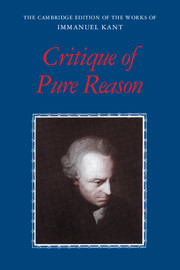Book contents
- Frontmatter
- Contents
- General editors' preface
- Acknowledgments
- Introduction
- Immanuel Kant, Critique of Pure Reason
- I Transcendental doctrine of elements
- Division two. Transcendental dialectic
- Book I On the concepts of pure reason
- Book II The dialectical inferences of pure reason
- Appendix to the transcendental dialectic
- II Transcendental doctrine of method
- Editorial Notes
- Glossary
- Index
Book I - On the concepts of pure reason
from Division two. Transcendental dialectic
Published online by Cambridge University Press: 05 July 2013
- Frontmatter
- Contents
- General editors' preface
- Acknowledgments
- Introduction
- Immanuel Kant, Critique of Pure Reason
- I Transcendental doctrine of elements
- Division two. Transcendental dialectic
- Book I On the concepts of pure reason
- Book II The dialectical inferences of pure reason
- Appendix to the transcendental dialectic
- II Transcendental doctrine of method
- Editorial Notes
- Glossary
- Index
Summary
However it may be with the possibility of concepts from pure reason, they are not merely reflected concepts but inferred concepts. Concepts of the understanding are also thought a priori before experience and on behalf of it; but they contain nothing beyond the unity of reflection on appearances, insofar as these appearances are supposed to belong necessarily to a possible empirical consciousness. Through them alone is cognition, and determination of an object, possible. They also first give material for inferring, and no a priori concepts of objects precede them, from which they could be inferred. On the contrary, their objective reality is founded solely on the fact that because they constitute the intellectual form of all experience, it must always be possible to show their application in experience.
The term "a concept of reason," however, already shows in a provisional way that such a concept will not let itself be limited to experience, because it deals with a cognition (perhaps the whole of possible experience or its empirical synthesis) of which the empirical is only one part; no actual experience is fully sufficient for it, but every experience belongs to it. Concepts of reason serve for comprehension, just as concepts of the understanding serve for understanding (of perceptions). If they contain the unconditioned, then they deal with something under which all experience belongs, but that is never itself an object of experience; something to which reason leads through its inferences, and by which reason estimates and measures the degree of its empirical use, but that never constitutes a member of the empirical synthesis.
- Type
- Chapter
- Information
- Critique of Pure Reason , pp. 394 - 408Publisher: Cambridge University PressPrint publication year: 1998

